Transversal reports - Local and regional elections
The Congress participates in the observation of local and regional elections in the 46 member countries of the Council of Europe and sometimes beyond, upon official request by the national authorities concerned. In addition to the country-specific observations and election reports, the Congress developed a strategy to better address problems which are of broader relevance. Such recurring transversal issues include, in particular, the reports below:
The situation of independent candidates and opposition in local and regional elections (2022)
Independent candidates and the opposition are a central element of democratic pluralism. Indeed, independents represent an increasingly important electoral alternative in view of the growing disenchantment with political parties, particularly at local and regional level.
In this report, adopted on 23 March 2022, the Congress of Local and Regional Authorities of the Council of Europe encourages the national authorities to limit the obstacles faced by independent candidates at the different stages of the electoral process, so that they can stand for local and regional elections on an equal footing with candidates from political parties.
Report CG(2022)42-13
Recommendation REC 476(2022)
Resolution RES 482 (2022)
Mediabox interview with Vladimir Prebilic
Beyond elections: the use of deliberative methods in European municipalities and regions (2022)
Citizen participation is increasingly used by governments as a complement to representative democracy specifically with the aim of strengthening public trust in the political process. It is now considered a reliable indicator of the health of a democracy as formalised in the 2009 Additional Protocol to the European Charter of Local Self-Government. Deliberative methods have become the most prominent and innovative element of this citizen participation and are particularly suited to the local and regional level.
The report “Beyond elections: The use of deliberative methods in European municipalities and regions”, adopted by the Congress of Local and Regional Authorities of the Council of Europe, offers guidelines for municipalities and regions, and illustrates them with case studies at local and regional levels: Mostar (Bosnia-Herzegovina), Oud-Heverlee (Belgium), Scottish Climate Assembly (UK) and Ostbelgien (Belgium).
Report CG(2022)42-12
Recommendation REC 472 (2022)
Resolution RES 480 (2022)
Holding referendums at local level (2021)
Local referendums are essential for surveying the citizens’ will on concrete issues that directly affect their everyday lives.
The Congress of Local and Regional Authorities has adopted effective guidelines on holding local referendums which are necessary to enable Member States to use local referendums responsibly, within the Council of Europe standards, including the European Charter of Local Self-Government, as well as international standards and best practices.
This booklet is also a valuable source of information on current problems, since the recurrent difficulties associated with the conduct of national, regional, and local referendums – although not always identical – are often similar.
Report CG(2021)40-11
Recommendation REC 459 (2021)
Resolution RES 472 (2021)
Local and regional elections in major crisis situations (2020)
In recent decades, several serious crises have exposed democracies in Europe and beyond to challenges to the normal functioning of democratic institutions, and in particular to local democracy. In the context of major crises, the democratic legitimacy provided by periodically held free and fair elections is more essential than ever. The holding of local and regional elections may, however, present difficulties leading to the postponement of elections or preventing the observation of local and regional elections in the field.
While the Congress of Local and Regional Authorities of the Council of Europe recognises that not all electoral standards can be applied in the event of a major crisis, it stresses that a minimum core of electoral principles have to be upheld for elections to be meaningful and to enjoy the trust of the public.
To this end, the Congress report provides guidelines based on international standards and best practices for the conduct and postponement of local and regional elections in times of major crisis.
Report CG-FORUM(2020)01-05
Recommendation REC 444 (2020)
Resolution RES 455 (2020)
Voting rights at local level as an element of successful long-term integration of migrants and IDPs in Europe’s municipalities and regions "(2018)
Against the backdrop of the ongoing migration flows in Europe, participation in local elections is a key factor of successful long-term integration of populations that reside, for various reasons, in places different from their places of origin.
The Congress of Local and Regional Authorities of the Council of Europe has adopted a report on the role of voting rights for the integration of internally displaced persons (IDPs) and migrants in Europe‘s municipalities and regions.
The Congress recommends that legal provisions at national level allow IDPs to exercise their right to vote by facilitating the procedures for changing residence and registration on voters’ lists. As regards the situation of migrants, there is a tendency to grant voting rights in local elections to foreign residents, in accordance with the Council of Europe Convention on the Participation of Foreigners in Public Life at the Local Level.
Report CG35(2018)17
Recommendation REC 419 (2018)
Resolution RES 431 (2018)
Checklist for compliance with international standards and good practices preventing misuse of administrative resources during electoral processes at local and regional level (2017)
In sport, fairness is a basic requirement for meaning- ful competition. As we know, not all athletes stick to this principle and some use disallowed ‘performance- enhancing drugs’to gain an unfair advantage over their competitors. This damages the reputation of individual athletes and their sport. Furthermore,‘doping’is a threat to sport in general, since fans and advertisers may lose interest in unfair or arguably ‘fixed’ competitions. This brings us to the competitive aspect of elections.
Candidates who misuse administrative resources in electoral processes are not only behaving unfairly towards their competitors, they are also undermining the foundation of our democratic culture, which isinseparable from the concept of fairness.
This practical guide contains a number of practical examples of such unfair behaviour in electoral processes and it explains why this problem must be taken seriously by member states of the Council of Europe, especially at the grassroots level.
Report CG32(2017)12
Criteria for standing in local and regional elections (2015)
The right to stand for election, whether at local, regional or national level, and thereby to participate in the management of public affairs, is one of the most important pillars of any democracy.
The Congress of Local and Regional Authorities of the Council of Europe calls on governments to review their legislation with the aim of eliminating unnecessary restrictions in order to give the largest possible proportion of the electorate the opportunity to stand for election.
The report on criteria for standing for local and regional elections, adopted by the Congress in 2015, addresses eligibility requirements relating to the person, ineligibility rules, as well as the issue of incompatibility, gender balance and practical measures.
Report CG/2015(28)7
Electoral lists and voters residing de facto abroad (2015)
The objectives of this study are to examine the international standards applicable to the question of voters residing de facto abroad and the national legislation applicable them, on the basis of national studies in 16 Council of Europe Member States.
The problem of electoral lists and voters residing de facto abroad must be examined in the light of the right to political participation, universal suffrage and the permissible restrictions of this right, in particular the criteria of residence.
Report CG/2015(28)6
Recommendation REC 369 (2015)
Resolution RES 378 (2015)
Voting at 16 – Consequences on youth participation at local and regional level (2015)
The Congress of Local and Regional Authorities of the Council of Europe, firmly believing that elections are the main “transmission belt” for citizens’ political participation and that local and regional ballots offer an ideal opportunity to experiment with lowering the voting age to 16, has adopted a report aimed at promoting a reduction in the minimum voting age in such elections.
The Congress report sets out the issues at stake in the debate here based on a comparative analysis of current practices regarding voting rights at local and regional level in the various Council of Europe member states.
The report also highlights several related issues, including gradually lowering the age requirement to stand for election and systematically providing civic and political education in schools.
Report CG/2015(29)8
Resolution RES 387 (2015)
Statement by Liisa Ansala, Congress rapporteur
Speech by Marcio Barcelos, Board member of the European Youth Forum
Congress debates local referendums, post-Covid crisis recovery and protection of LGBTI people
Congress calls for ensuring respect for electoral standards in major crisis situations
Voting rights at local level: A factor in the long-term integration of IDPs and migrants
New Congress‘ Checklist to prevent misuse of administrative resources during elections
Promoting voting at 16 to strengthen young people's participation in political life
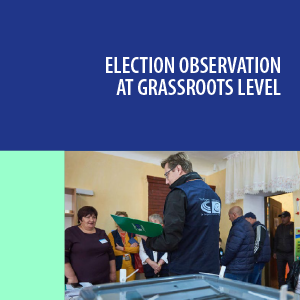
Booklet
A5 - 24 pages - pdf
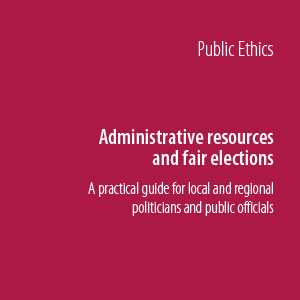
Booklet
A6 - 58 pages - pdf
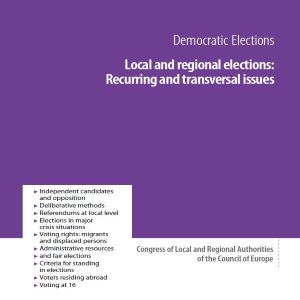
Leaflet
A5 - pdf
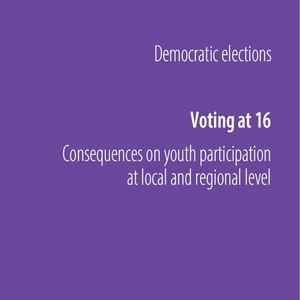
Booklet
A6 - 76 pages - pdf
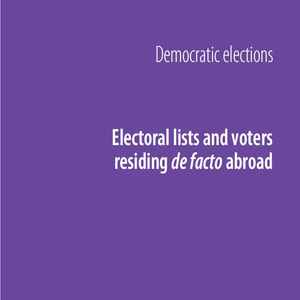
Booklet
A6 - 71 pages - pdf
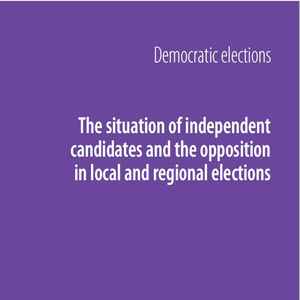
Booklet
A6 - 69 pages - pdf
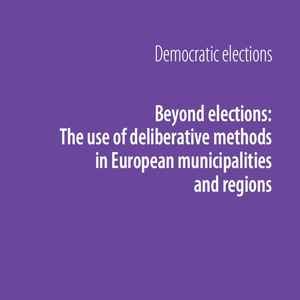
Booklet
A6 - 80 pages - pdf
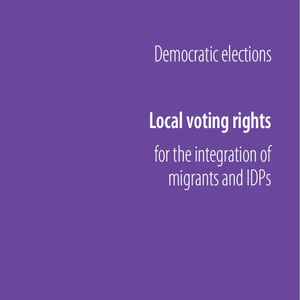
Booklet
A6 - 80 pages - pdf
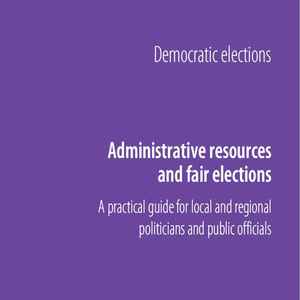
Booklet
A6 - 67 pages - pdf
Monitoring committee

Committee Secretary
Observation of local and regional elections







